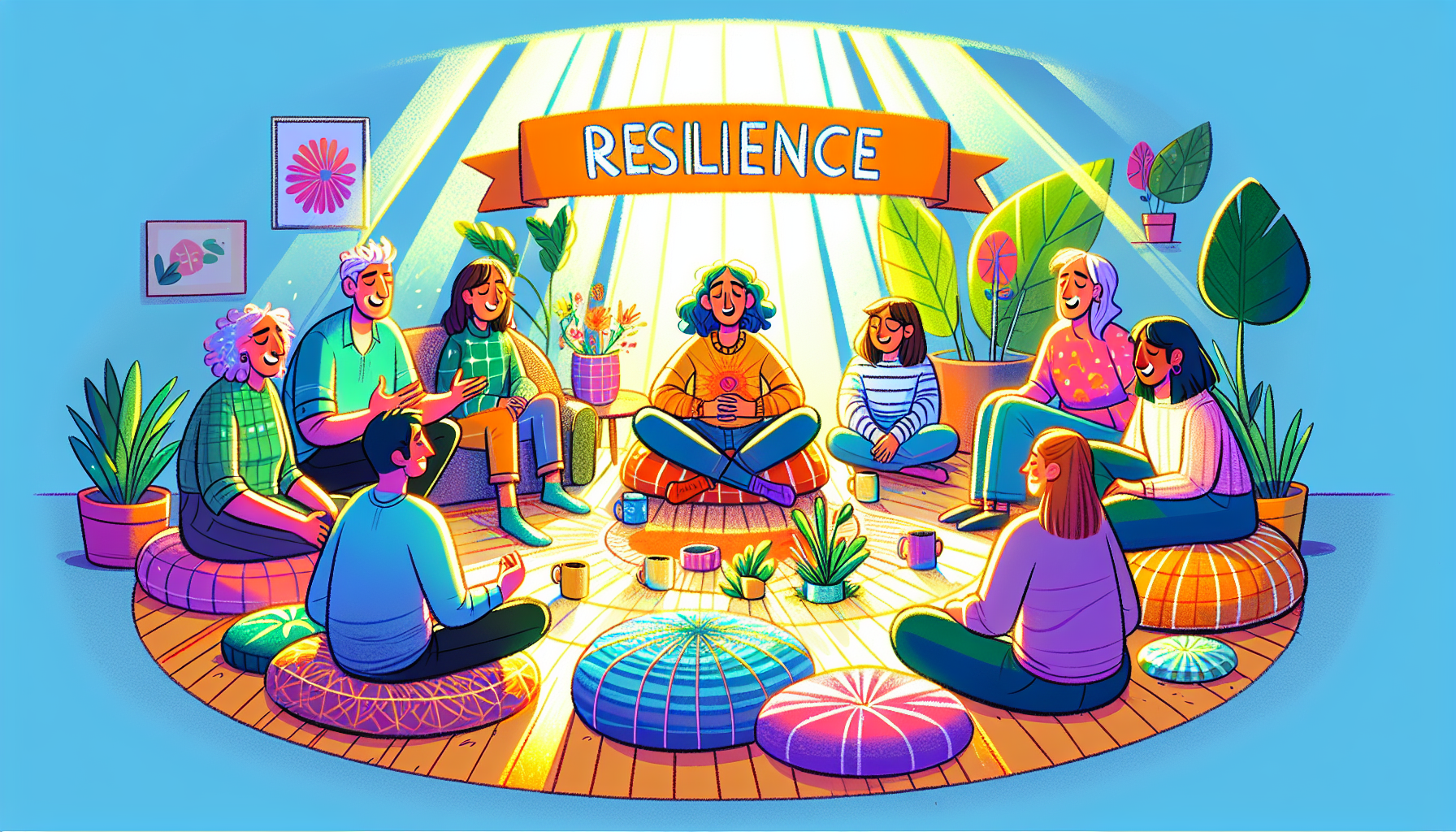Resilience means overcoming tough challenges. This article shares real examples of resilience, highlighting how people like Henry Ford turned obstacles into successes.
Key Takeaways
- Resilience is defined as the ability to recover and adapt to stress and adversity, exemplified by leaders like Kenneth Langone and Ursula Burns.
- Building resilience involves emotional, mental, and physical dimensions, with support from social networks and healthy lifestyle choices playing a crucial role.
- Community and workplace resilience are essential for overcoming challenges collectively, emphasizing the importance of leadership and collaboration in times of crisis.
Top Examples of Resilience: Overcoming Life’s Challenges

Resilience involves facing and overcoming significant challenges. Here are some notable examples:
- Kenneth Langone co-founded Home Depot after financial hardships.
- Ursula Burns became the CEO of Xerox despite a challenging environment.
- Narendra Modi rose from humble beginnings to become the Prime Minister of India.
- Henry Ford overcame bankruptcy to succeed with Ford Motor Company.
These stories show resilience as the ability to recover, resist, and adapt to stress and adversity, blending a person’s ability, environmental factors, and learned skills.
These individuals turned setbacks into opportunities, demonstrating how perseverance can lead to significant achievements and innovations.
Introduction
Resilience is the psychological resilience strength to cope with stress and hardship, enabling us to bounce back from setbacks and adapt to challenges. In personal and professional realms, it helps us navigate life’s ups and downs, ensuring we thrive despite adversity.
Resilience comes in various forms: emotional, mental resilience, and physical. Developing these skills enhances our capacity to deal with stress and recover from word resilience setbacks.
This article explores personal stories, workplace dynamics, community efforts, and practical strategies for cultivating resilience, offering a comprehensive guide to building and sustaining this crucial trait.
Personal Resilience Stories

Resilience enables individuals to thrive despite challenges. The stories of Kenneth Langone, Ursula Burns, Narendra Modi, and Henry Ford illustrate how it helps overcome significant obstacles and achieve success.
These examples show how personal resilience turns adversity into opportunity, emphasizing the importance of strong coping skills and challenging life experiences.
Overcoming Health Crises
Health crises test our physical resilience—the ability to adapt to challenges and recover quickly. It influences aging, response, and recovery from physical stress, making it crucial during health crises. Staying calm and managing stress effectively aids recovery.
Healthy habits like regular exercise, sufficient sleep, and proper nutrition significantly improve physical resilience. These choices enhance our body’s ability to handle stress and recover from illness, ensuring better health and well-being.
Triumphing Over Financial Hardships
Financial difficulties can be stressful, but maintaining optimism can lead to better decisions and outcomes. Successfully navigating financial crises often strengthens problem-solving skills, turning adversity into opportunity.
Kenneth Langone co-founded Home Depot after financial hardships, and Ursula Burns became CEO of Xerox despite challenges. Their journeys show how emotional resilience and a positive outlook can lead to remarkable achievements.
Surviving Natural Disasters
Natural disasters test both physical and emotional resilience. One family lost their home in a hurricane but demonstrated determination to rebuild. Another individual turned grief from an earthquake into a mission to support others.
Successful recovery from natural disasters often depends on strong community bonds. Communities providing emotional, financial, and physical support to neighbors play a crucial role in rebuilding lives. Collective effort and resilience are essential in overcoming adversity.
Resilience in Children and Adolescents

Resilience helps children and adolescents adapt to challenges and maintain a positive outlook despite difficulties. Emotionally resilient people know adversity is temporary, and this mindset can be cultivated from a young age.
Social support and resources enhance coping abilities during crises, highlighting the importance of a supportive environment in building resilience.
Building Resilience in School
Schools are excellent for building resilience in children. Support from teachers and peers aids in developing resilience, helping students cope with academic and social challenges. Encouraging positive thinking helps children develop strong coping skills.
Cinderella’s story exemplifies resilience through her optimism and compassion despite abuse. By maintaining a positive outlook and seeking support, children can learn to navigate difficult situations and build resilience.
Coping with Family Issues
Family issues can be stressful for children and adolescents. Emotional regulation and problem-solving are key aspects of resilience. Knowing when to ask for support is essential for managing family crises effectively.
A strong support network is critical during tough times. Social support enhances resilience, helping children and teens cope with family issues and maintain mental well-being.
Workplace Resilience
Workplace resilience is crucial for adapting to challenges like the coronavirus pandemic. Social isolation, working from home, and virtual meetings tested employees’ resilience, highlighting the need for organizational training and support. Adaptability is key to growth, performance, and employee well-being, making resilience essential.
Adapting to Remote Work
Successful remote workers prioritize maintaining a healthy lifestyle and managing stress. Healthy habits like regular exercise, sufficient sleep, and structured routines significantly enhance resilience.
These practices help manage stress and maintain mental well-being while working remotely.
Leadership During Crises
Effective leadership during crises is vital for building resilience within teams and organizations. Leaders need strong resilience skills to navigate tough times and support their teams. Meeting basic needs like community, connection, belonging, and purpose fosters resilience.
Leaders can enhance team resilience by setting clear goals, promoting open communication, and providing opportunities for team members to voice concerns. Explaining the reasons behind changes boosts employee support and fosters a resilient culture.
Community Resilience

Community resilience involves collective efforts to adapt and thrive despite challenges. Effective communication and collaboration among community members enhance resilience to climate-related challenges and other adversities.
Communities boost resilience through social networks fostering mutual support and collaboration, leading to better outcomes during crises.
Recovery After Terrorist Attacks
Community support is crucial for recovery after terrorist attacks. Children helping others during such crises feel empowered, improving their ability to cope with trauma. This sense of empowerment and mutual aid fosters a resilient community spirit.
Successful recovery often involves local leadership to mobilize resources and support, emphasizing the importance of strong community bonds. By coming together, communities rebuild and recover more effectively, demonstrating the power of collective resilience.
Rebuilding After Climate Change Events
Communities facing climate change have implemented strategies to enhance resilience. Coastal towns adopt managed retreat strategies to reduce vulnerability to rising sea levels. Cities experiencing severe flooding introduce green infrastructure, like rain gardens, to absorb excess rainfall.
Local workshops and training community members in resilience skills foster disaster preparedness and recovery plans. Strong alliances between local governments and citizens are crucial for successful climate adaptation and resilience-building efforts.
Developing Resilience Skills

Building resilience isn’t just about recovering from setbacks; it’s about growing stronger and more capable. Strategies include positive thinking, seeking social support, and effective stress management to develop resilience.
Developing resilience training equips individuals with the mindset to learn from failures and move forward with necessary lessons.
Practicing Self-Awareness
Practicing self-awareness is fundamental in building resilience. Emotional resilience involves managing emotions and recognizing that challenging situations are temporary. This awareness helps maintain control and perspective during stressful times.
Both adults and children benefit from learning stress management skills, like deep breathing and mindfulness. These practices enhance emotional resilience, allowing individuals to handle challenges with greater ease and composure.
Seeking Social Support
A strong social support network is essential for developing resilience, especially during challenging times. Effective social support helps individuals cope with stress and difficulties. Discussing life’s challenges provides support and insight for better coping.
When managing challenges becomes difficult, seeking help is important. Consulting a healthcare provider or mental health professional can be beneficial. Support from a cognitive therapist provides a safe space for emotional expression and enhances the ability to manage crises.
Managing Daily Stressors
Managing daily stressors is critical to building resilience. Cultivating resilience helps manage stress, challenges, and change more effectively. Healthy behaviors like adequate sleep, regular exercise, and specific actions during stressful situations are effective for managing stress.
Incorporating healthy lifestyle choices into daily routines improves mental well-being and enhances the ability to handle adversity, particularly for those facing mental health conditions. Developing strong coping skills and a resilient mindset helps navigate daily stressors with greater ease.
Summary
In conclusion, resilience is a vital trait that enables individuals and communities to thrive despite life’s challenges. From personal stories of overcoming health crises, financial hardships, and natural disasters to the resilience demonstrated in children, adolescents, and workplaces, the importance of building resilience skills cannot be overstated. Developing resilience involves a combination of emotional, mental, and physical resilience, supported by strong coping skills and social support networks.
As we face an increasingly uncertain world, cultivating resilience is more important than ever. By practicing self-awareness, seeking social support, and managing daily stressors, we can develop the resilience needed to handle adversity and emerge stronger from difficult situations. Embracing resilience as a key factor in human development will empower us to navigate life’s challenges with confidence and inner strength.
Frequently Asked Questions
What is resilience?
Resilience is defined as the psychological strength that allows individuals to effectively cope with stress and hardship, facilitating recovery from setbacks and adaptation to challenging situations.
How can resilience be developed?
Resilience can be developed by cultivating positive thinking, seeking social support, effectively managing stress, and strengthening coping skills. These strategies significantly enhance one’s ability to face challenges and bounce back from adversity.
Why is community resilience important?
Community resilience is crucial as it fosters collective adaptation and recovery from crises, enhancing a community’s ability to support and collaborate with one another during challenging times. This mutual support ultimately strengthens the overall fabric of the community.
How can children build resilience?
Children can build resilience by learning to manage their emotions, seeking support from adults, and developing effective problem-solving skills to navigate challenges. These strategies empower them to face difficulties with confidence.
What role does leadership play in workplace resilience?
Leadership is essential for workplace resilience, as it fosters a supportive environment through clear communication and goal-setting, enabling teams to adeptly navigate challenges. Effective leadership directly enhances an organization’s ability to withstand and recover from crises.










